 Burleigh Heads, Queensland, as it was in the 1930s, when Edwin
operated a bakery in the resort town
Burleigh Heads, Queensland, as it was in the 1930s, when Edwin
operated a bakery in the resort town
Edwin Dance (1897-1969)
"The
Bakery Bomber"
This block will be replaced by LeftMenuGaffey (orByrnes) when the page is served from a server.
- Father:
- William Henry DANCE (1867, Devon -Dec 16 1924, Marburg, Queensland
- Mother:
- Amalia Christina RETCHSLAG (Oct 5 1871, Haigslea, Qld-Sep 15 1903, Marburg)
- Birth:
- 27 August 1897, Marburg, Queensland.
- Lived at:
- Marburg, Gatton, Burleigh Heads, Maroochydore (Queensland).
- Marriage:
- 3 July, 1919, to Maria Wilhelmina Sprenger
- Death:
- January, 1969
Years ago, we discovered there had
been six convicts among my mother’s ancestors, transported to Australia
from Britain way back when. This caused mortification for my mother (she
was of a generation that found such a background embarrassing), but my
father used to take great delight in referring to his in-laws as the
“criminal branch of the family". Such jovial point scoring came to an
end when we found a couple of miscreants in his own Byrnes family who,
for one reason or another, found themselves on the wrong side of the
law. (Sadly, my mother had died by then and so was unable to enjoy the
turn of events).
This is the story of one such man...
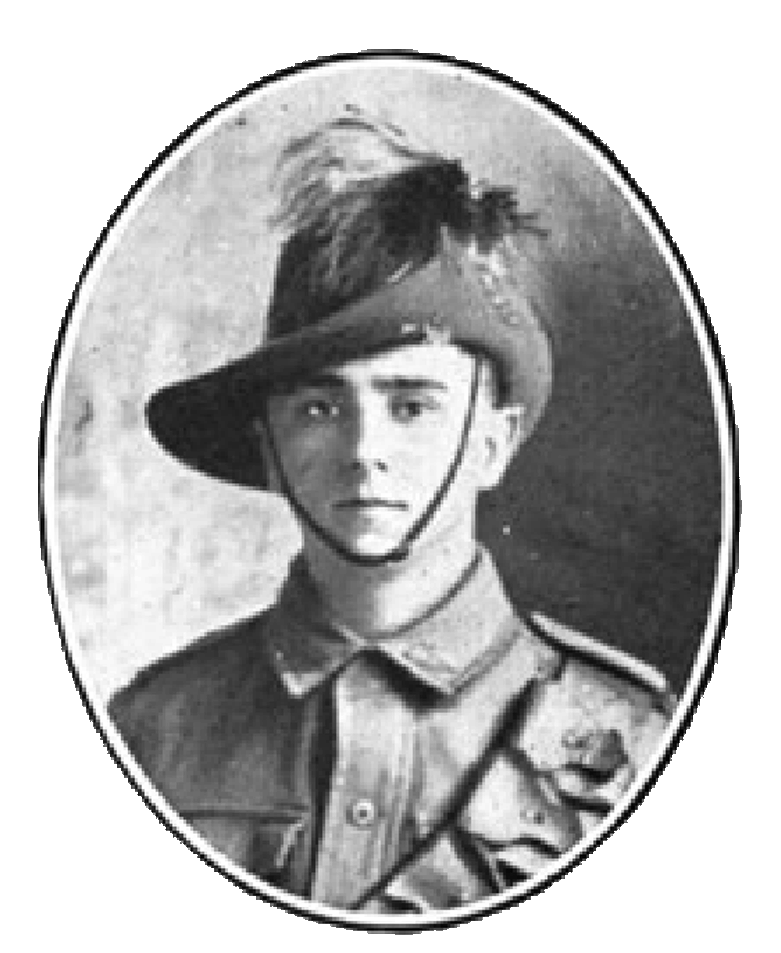
Edwin Dance in
the uniform of the 41st Battalion, Australian Imperial Force (1916)
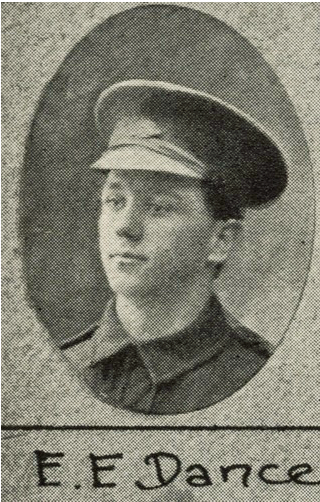 Edwin was one of
ten brothers, sons of a prominent businessman and farmer William Dance,
in Marburg, a country town not far from Brisbane.
Nineteen-year-old Edwin and two of his brothers, Charles and Francis
Herbert, perhaps seeking adventure, signed up to go to war in
1916. As well as aiming for
adventure, they may have felt they were defending the Empire (although,
it should be noted, their mother, Amalia Retschlag, was of German
extraction). Their father had been
born in Devon, back in the 1860s, setting out for Australia as a young
man in the 1880s. On his enlistment
papers, Edwin described himself as “British-born”, as was the custom of
the time.
Edwin was one of
ten brothers, sons of a prominent businessman and farmer William Dance,
in Marburg, a country town not far from Brisbane.
Nineteen-year-old Edwin and two of his brothers, Charles and Francis
Herbert, perhaps seeking adventure, signed up to go to war in
1916. As well as aiming for
adventure, they may have felt they were defending the Empire (although,
it should be noted, their mother, Amalia Retschlag, was of German
extraction). Their father had been
born in Devon, back in the 1860s, setting out for Australia as a young
man in the 1880s. On his enlistment
papers, Edwin described himself as “British-born”, as was the custom of
the time.
Edwin, one of the soldiers'
photographs published in a special supplement to The Queenslander
magazine in 1917
Edwin was sent to England, with the 41st
Regiment arriving at the end of January, 1917:
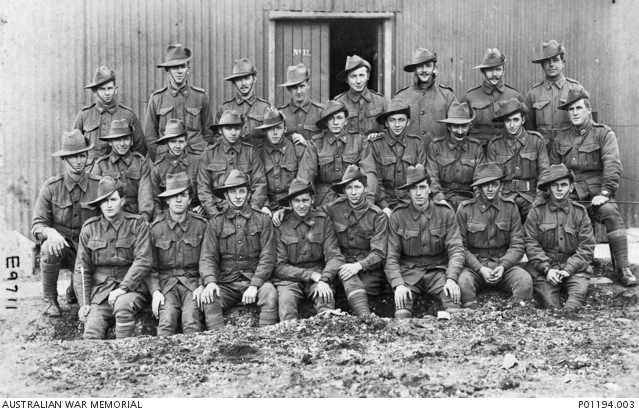
At the Larkhill military camp in
Wiltshire.
Members of No 8 hut, 5 Platoon, B company, 41 Infantry Battalion. Edwin is thought to be in the second row, 4th from the left.
Members of No 8 hut, 5 Platoon, B company, 41 Infantry Battalion. Edwin is thought to be in the second row, 4th from the left.
On the battlefields of northwestern France, Edwin was both lucky and unlucky - he was wounded twice (gunshot wounds to the shoulder and stomach), but survived each time, being sent back to England for treatment and convalescence, before returning to the fighting. A good fighter he may have been, but his discipline record had a few blemishes. A couple of absence-without-leave cost him a few days pay, and in another instance, more fines followed a "neglect to obey" and "trespass", presumably a minor form of insurrection.
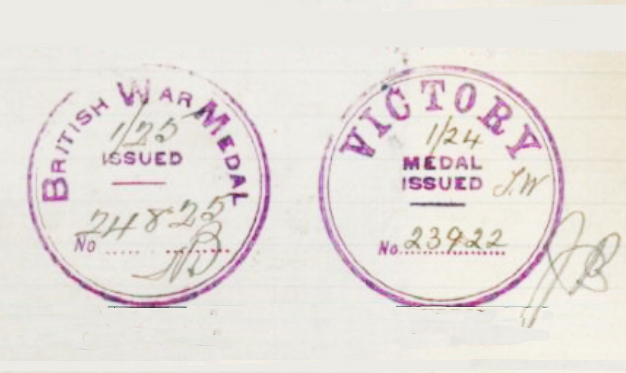
At war's end, Edwin returned to Marburg to marry a lass of German
descent (Maria Sprenger) and to farm life with his father, with a couple
of standard-issue medals (above) to
show for his "adventure". The little family of Edwin, Maria and their
young son had a few setbacks early in their married life. A house
they were renting in nearby Rosewood in 1923 was destroyed by fire,
fortunately when the family was away from home.
A quiet life may not have appealed to Edwin - in the 1920s, he had a
couple of run-ins with the local constabulary. Within a month of his
father's death in December 1924, Eddie and his fellow soldier brother
Francis found themselves up on assault charges involving a local
shopkeeper. According to Eddie and Francis, the man who ended up on the
wrong side of their fists had several times called their newly-deceased
father "a .(...) mongrel" (apparently over a business deal).
The obviously sympathetic jury found Francis "not guilty", and Eddie
"guilty of common assault under provocation".
The next - relatively minor - transgression on the public record came in 1932 when he was fined the more considerable sum of £12 for possessing an unlicensed firearm.
After his father's death in 1925, the Dance family's two farms were
sold, which meant that Edwin had to look elsewhere for work. He
sometimes contracted to do work for the Department of Main Roads around
Marburg - work which gave him lessons in explosives, a skill which he
used a few years later resulting in serious trouble with the law.
In the 1920s, some of the Dance family had branched out in the bakery
business, and at the time of the firearms offence, Eddie was
working as a baker in Gatton, a town a little further west of Marburg.
The next year, in September he had the chance to set
up in business on what later became Queensland's Gold Coast, buying a
bakery at West Burleigh.
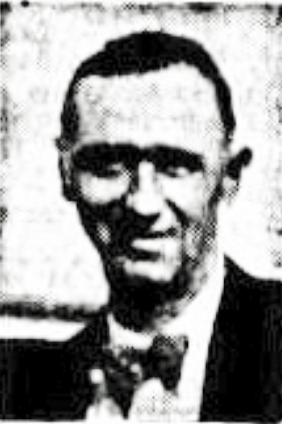 As a
businessman, he didn't take too kindly to the prospect of another baker
coming in to what he saw as his territory at Burleigh, and when an
opposition baker's oven and business were blown up less than a year
later in early February, 1934, police soon focussed their attention on
Edwin. He hadn't covered his tracks very well - at his trial, the court
was told that he had called on his older brother William to organise the
gelignite he needed to do the job. William testified that he asked a
cousin, Robert Dance, to buy gelignite, fuse and detonators, and leave
it at a hotel in Marburg for Eddie to pick up. The court wasn't
told what William - and Robert - thought of this request, but they
carried it out for their brother and cousin.
The bombing was fairly amateurish - while the opposition's bakery was
unattended around midnight, the gelignite was left in the oven there and
lit with a 20ft (about six metres) fuse. This enabled the bomber
to make a quick getaway, which he did, according to local householders
who heard a vehicle leaving the bakery around midnight, going at 40mph
up steep Burleigh Hill.
The jury didn't take long to consider their verdict - after an hour,
they came back with "guilty". The judge said he had taken Edwin's
honorable war record into account, and was therefore imposing a 'light'
sentence - three years hard labour.
left: a photo of Edwin used in a newspaper
report of the court case.
As a
businessman, he didn't take too kindly to the prospect of another baker
coming in to what he saw as his territory at Burleigh, and when an
opposition baker's oven and business were blown up less than a year
later in early February, 1934, police soon focussed their attention on
Edwin. He hadn't covered his tracks very well - at his trial, the court
was told that he had called on his older brother William to organise the
gelignite he needed to do the job. William testified that he asked a
cousin, Robert Dance, to buy gelignite, fuse and detonators, and leave
it at a hotel in Marburg for Eddie to pick up. The court wasn't
told what William - and Robert - thought of this request, but they
carried it out for their brother and cousin.
The bombing was fairly amateurish - while the opposition's bakery was
unattended around midnight, the gelignite was left in the oven there and
lit with a 20ft (about six metres) fuse. This enabled the bomber
to make a quick getaway, which he did, according to local householders
who heard a vehicle leaving the bakery around midnight, going at 40mph
up steep Burleigh Hill.
The jury didn't take long to consider their verdict - after an hour,
they came back with "guilty". The judge said he had taken Edwin's
honorable war record into account, and was therefore imposing a 'light'
sentence - three years hard labour.
left: a photo of Edwin used in a newspaper
report of the court case.
His Honour: "I hold
that as a verdict of Not Guilty".
The trial had earlier
been told that up until the time of the incident, both Dance boys had
been of good character, although the constable giving evidence added:
"But Eddie was had up for creating a disturbance. He was fined
five shillings".
His Honour: "It must have been a very
serious case". (Laughter).
The next - relatively minor - transgression on the public record came in 1932 when he was fined the more considerable sum of £12 for possessing an unlicensed firearm.
 As a
businessman, he didn't take too kindly to the prospect of another baker
coming in to what he saw as his territory at Burleigh, and when an
opposition baker's oven and business were blown up less than a year
later in early February, 1934, police soon focussed their attention on
Edwin. He hadn't covered his tracks very well - at his trial, the court
was told that he had called on his older brother William to organise the
gelignite he needed to do the job. William testified that he asked a
cousin, Robert Dance, to buy gelignite, fuse and detonators, and leave
it at a hotel in Marburg for Eddie to pick up. The court wasn't
told what William - and Robert - thought of this request, but they
carried it out for their brother and cousin.
The bombing was fairly amateurish - while the opposition's bakery was
unattended around midnight, the gelignite was left in the oven there and
lit with a 20ft (about six metres) fuse. This enabled the bomber
to make a quick getaway, which he did, according to local householders
who heard a vehicle leaving the bakery around midnight, going at 40mph
up steep Burleigh Hill.
The jury didn't take long to consider their verdict - after an hour,
they came back with "guilty". The judge said he had taken Edwin's
honorable war record into account, and was therefore imposing a 'light'
sentence - three years hard labour.
left: a photo of Edwin used in a newspaper
report of the court case.
As a
businessman, he didn't take too kindly to the prospect of another baker
coming in to what he saw as his territory at Burleigh, and when an
opposition baker's oven and business were blown up less than a year
later in early February, 1934, police soon focussed their attention on
Edwin. He hadn't covered his tracks very well - at his trial, the court
was told that he had called on his older brother William to organise the
gelignite he needed to do the job. William testified that he asked a
cousin, Robert Dance, to buy gelignite, fuse and detonators, and leave
it at a hotel in Marburg for Eddie to pick up. The court wasn't
told what William - and Robert - thought of this request, but they
carried it out for their brother and cousin.
The bombing was fairly amateurish - while the opposition's bakery was
unattended around midnight, the gelignite was left in the oven there and
lit with a 20ft (about six metres) fuse. This enabled the bomber
to make a quick getaway, which he did, according to local householders
who heard a vehicle leaving the bakery around midnight, going at 40mph
up steep Burleigh Hill.
The jury didn't take long to consider their verdict - after an hour,
they came back with "guilty". The judge said he had taken Edwin's
honorable war record into account, and was therefore imposing a 'light'
sentence - three years hard labour.
left: a photo of Edwin used in a newspaper
report of the court case.
Where he actually served the sentence isn't
really known. Admission/reception registers from the Brisbane
Correctional Centre (presumably what was familiarly known as Boggo
Road) list Edwin as being there in 1934 and 1935. He also gets a
mention in the records of Palen Creek, a then new low-security jail,
near Rathdowney, not far from the Qld/NSW border. while the Index of
the St Helena Island Prison also lists Edwin as being an inmate on the
island in 1935. There's a slight problem with this - the island prison
is supposed to have been closed as a jail three years earlier.
In 1936, Edwin's case also came to the attention of the Queensland
Parliament. The State Opposition Leader, and Member for West
Moreton, Ted Maher, asked to present a petition from some of his
constituents seeking the remission of what was left of the sentence.
The petition may have been successful, for by October of that year,
Eddie was out of jail, operating a cafe with his wife Maria in
Maroochydore on Queensland's Sunshine Coast.
Once freed, he soon appears again in police records, accused of being an
unlicensed seller of liquor at his cafe (the police charge uses the term
"refreshment rooms"). Police said they found 54 bottles of stout and 39
bottles of beer on the premises - and a bottle of champagne. Edwin
said the beer was for himself and his friends, and the stout for his
wife, because a doctor had recommended she drink stout for her
health. He said none was for sale.
At the first hearing, he was found guilty, fined £30 (in default two
months imprisonment) and all the alcohol confiscated . But
subsequently, the warrant used by the police was found to be deficient,
and therefore couldn't be used legally to inspect the premises and take
the alcohol. So the magistrate then ordered all the alcohol to be
returned!
And that appears to be the end of Edwin's police record.
By 1941, he had reverted to his trade of bakery, but in the years after
World War 2, the only other data so far uncovered on him and his wife
are the Queensland electoral records, which show him working as a
fisherman at Maroochydore, where he died in 1969, aged 71.
*****